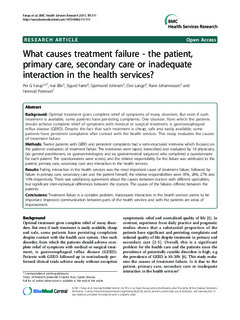| dc.contributor.author | Farup, Per Grønaas | |
| dc.contributor.author | Blix, Ivar | |
| dc.contributor.author | Førre, Sigurd | |
| dc.contributor.author | Johnsen, Gjermund | |
| dc.contributor.author | Lange, Ove Juel | |
| dc.contributor.author | Johannessen, Rune | |
| dc.contributor.author | Petersen, Hermod | |
| dc.date.accessioned | 2015-09-11T11:38:56Z | |
| dc.date.accessioned | 2015-09-17T13:34:46Z | |
| dc.date.available | 2015-09-11T11:38:56Z | |
| dc.date.available | 2015-09-17T13:34:46Z | |
| dc.date.issued | 2011 | |
| dc.identifier.citation | BMC Health Services Research 2011, 11 | nb_NO |
| dc.identifier.issn | 1472-6963 | |
| dc.identifier.uri | http://hdl.handle.net/11250/300603 | |
| dc.description.abstract | Background: Optimal treatment gives complete relief of symptoms of many disorders. But even if such
treatment is available, some patients have persisting complaints. One disorder, from which the patients
should achieve complete relief of symptoms with medical or surgical treatment, is gastroesophageal
reflux disease (GERD). Despite the fact that such treatment is cheap, safe and easily available; some
patients have persistent complaints after contact with the health services. This study evaluates the causes
of treatment failure.
Methods: Twelve patients with GERD and persistent complaints had a semi-structured interview which focused on
the patients’ evaluation of treatment failure. The interviews were taped, transcribed and evaluated by 18 physicians,
(six general practitioners, six gastroenterologists and six gastrointestinal surgeons) who completed a questionnaire
for each patient. The questionnaires were scored, and the relative responsibility for the failure was attributed to the
patient, primary care, secondary care and interaction in the health services.
Results: Failing interaction in the health services was the most important cause of treatment failure, followed by
failure in primary care, secondary care and the patient himself; the relative responsibilities were 35%, 28%, 27% and
10% respectively. There was satisfactory agreement about the causes between doctors with different specialities,
but significant inter-individual differences between the doctors. The causes of the failures differed between the
patients.
Conclusions: Treatment failure is a complex problem. Inadequate interaction in the health services seems to be
important. Improved communication between parts of the health services and with the patients are areas of
improvement. | nb_NO |
| dc.language.iso | eng | nb_NO |
| dc.publisher | BioMed Central | nb_NO |
| dc.title | What causes treatment failure - the patient, primary care, secondary care or inadequate interaction in the health services? | nb_NO |
| dc.type | Journal article | nb_NO |
| dc.type | Peer reviewed | en_GB |
| dc.date.updated | 2015-09-11T11:38:56Z | |
| dc.source.volume | 11 | nb_NO |
| dc.source.journal | BMC Health Services Research | nb_NO |
| dc.source.issue | 111 | nb_NO |
| dc.identifier.doi | 10.1186/1472-6963-11-111 | |
| dc.identifier.cristin | 835477 | |
| dc.description.localcode | © 2011 Farup et al; licensee BioMed Central Ltd. This is an Open Access article distributed under the terms of the Creative Commons Attribution License (http://creativecommons.org/licenses/by/2.0), which permits unrestricted use, distribution, and reproduction in any medium, provided the original work is properly cited. | nb_NO |
